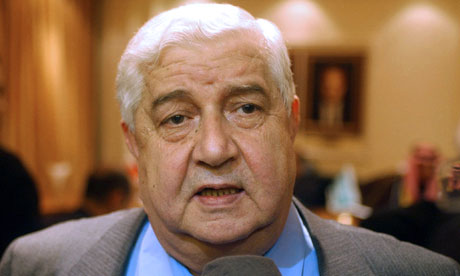Syria accuses EU of meddling as it imposes sanctions
Syria calls measures the equivalent to 'war' while promising to turn country into model democracy

Syrian foreign minister Walid al-Moallem has lambasted new EU sanctions against his country. Photograph: Khalil Mazraawi/Getty Images
Syria has lashed out at international "meddling" in its internal affairs and lambasted new EU sanctions that also target the commander of the al-Quds force of Iran's revolutionary guards, accused by the west of helping crush the unprecedented unrest. Walid al-Moallem, Syria's foreign minister, called the sanctions the equivalent to "war", while promising to turn the country into a model democracy. He accused EU states of trying to "plant strife and chaos" after they agreed to extend punitive measures against Bashar al-Assad's regime in response to the repression of protests that has cost 1,400 lives in three months. The Guardian has learned that the sanctions target General Qassem Soleimani, commander of the elite al-Quds, who is already subject to US sanctions. Moallem denied that Tehran or Syria's Lebanese protege Hezbollah had been involved. He singled out France for harbouring ambitions derived from its history as Syria's colonial ruler and urged Turkey to "reconsider" its increasinglyown hostile stance. Moallem blamed al-Qaida for killings of security personnel. Around 300 soldiers and other members of the security forces have been killed, alongside civilian casualties, in this bloody chapter of the Arab spring. The minister's comments showed the Syrian regime flexing its muscles amid the overwhelmingly negative reaction to reform proposals Assad made in his speech on Monday. The US called for "action, not words" in response to that address – only Assad's third since the crisis began. "We will forget that Europe is on the map and we will look east, south and towards every hand that is extended to us," Moallem said in a televised speech. Russia and China are continuing to block western attempts to pass a UN security council resolution condemning Syria. British officials dismissed his remarks. A Foreign Office spokesman said: "It is the regime's own brutal repression of peaceful protest that is harming the Syrian people and the Syrian economy. We will continue to increase the pressure on President Assad and those around him until they recognise that the legitimate aspirations of the Syrian people must be met with reform not repression." The new EU sanctions target individuals and companies in Syria's business community to increase economic pressure on the regime, as well as on Soleimani and two other Iranians accused of "providing military equipment and support". Syria is no stranger to international isolation. During the 2003 Iraq war many in Washington regarded it as an easy target for criticism. Tensions were heightened in 2005 when Lebanon's ex-prime minister Rafiq al-Hariri was assassinated – though Damascus always denied responsibility. "Most Syrians would be horrified at the thought of reliving the isolation endured by Syria in the 80s and part of the 90s," said Rime Allaf, a Syrian analyst at the Chatham House thinktank in London. "While the idea of foreign intervention is overwhelmingly rejected by regime fans and critics alike, diplomatic pressure is to be expected from Europe." But analysts believe the regime still thinks it can contain this crisis through a mixture of repression and reform. Moallem promised reforms that would allow Syria to "give lessons for others in democracy". A draft law to regulate new political parties, potentially ending Ba'athist dominance, has been published. After Assad's speech, state media announced a presidential decree granting amnesty to prisoners, excluding political detainees. But domestic opposition, which appears to be slowly growing, rejected the pledges as insincere and too little, too late. "The parties law is not bad," said one opposition analyst who asked for anonymity. "But no one really believes that the regime will allow true power-sharing because it will ultimately lead to its downfall."More.






 6/23/2011 10:39:00 AM
6/23/2011 10:39:00 AM
 live news
live news












0 commentaires:
Post a Comment